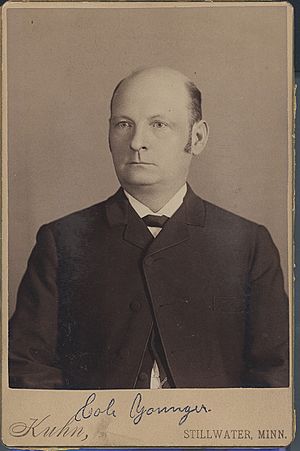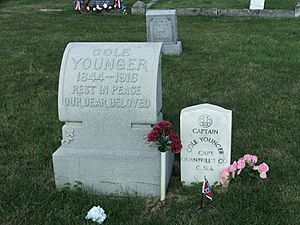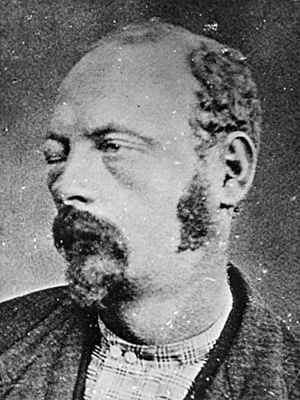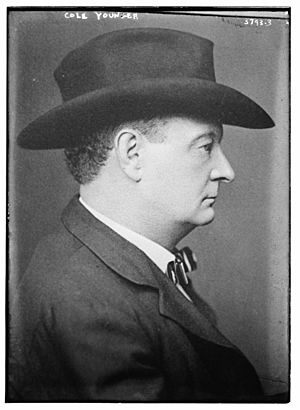Cole Younger facts for kids
Quick facts for kids
Cole Younger
|
|
|---|---|

Portrait of Cole Younger taken when he was a prisoner at the Minnesota State Prison, c. 1889
|
|
| Born |
Thomas Coleman Younger
January 15, 1844 |
| Died | March 21, 1916 (aged 72) |
| Resting place | Lee's Summit Historical Cemetery |
| Occupation |
|
| Known for |
|
| Parent(s) |
|
| Signature | |
Thomas Coleman Younger (born January 15, 1844 – died March 21, 1916) was an American Confederate fighter during the American Civil War. He later became a famous outlaw leader. Cole was part of the well-known James–Younger Gang. His younger brothers, Jim, John, and Bob Younger, were also members of this gang.
Contents
Early Life
Cole Younger was born on January 15, 1844. His family lived on a farm in Jackson County, Missouri. His father, Henry Washington Younger, was a successful farmer. His mother, Bersheba Leighton Fristoe, came from another important family in Jackson County. Cole was the seventh of fourteen children in his family.
Civil War Years
During the American Civil War, there was a lot of fighting in Missouri. Cole Younger's father supported the Union side. Sadly, a Union soldier from Kansas shot and killed him. After this, Cole Younger wanted revenge. He joined a group of pro-Confederate fighters called "bushwhackers." These groups fought under leaders like William Clarke Quantrill.
By 1862, the main Confederate Army had left Missouri. Most of the fighting was between local groups who supported either the Union or the Confederacy. The bushwhackers especially disliked Union troops from Kansas. These Kansas soldiers were known for being very tough. Cole Younger rode with Quantrill during a raid on Lawrence, Kansas on August 21, 1863. During this attack, about 200 people were killed, and the town was robbed and burned.
Younger later said he left the bushwhackers and joined the regular Confederate Army. He claimed he went to California to recruit soldiers. After the war ended, he returned to Missouri. He found that former Union supporters were now in charge. They had made new laws that made it hard for anyone who had supported the Confederacy.
Life as an Outlaw
After the war, most former bushwhackers tried to live peaceful lives. Many left Missouri for other states like Kentucky. But a small group of fighters stayed together. They were led by Archie Clement. Authorities believed Clement's gang robbed the first bank in daylight after the war. This happened in Clay County, Missouri on February 13, 1866. The governor offered a reward for Clement.
It is not clear when the Younger brothers joined Clement's gang. The first time they were mentioned was in 1868. Cole was identified as part of a gang that robbed a bank in Russellville, Kentucky. As older gang members were caught or killed, the main group became the Younger brothers and Frank and Jesse James.
Cole Younger was often identified in robberies over the next few years. The gang robbed banks and stagecoaches in Missouri and Kentucky. On July 21, 1873, they started robbing trains. They stopped a train and stole from the express car in Adair, Iowa. The Younger brothers were also suspected of robberies in other states.
After a train robbery in Gads Hill, Missouri in 1874, the Pinkerton National Detective Agency started chasing the James–Younger Gang. There were gunfights between the Pinkerton agents and the gang. Some agents and gang members were killed. The James and Younger brothers avoided capture for a long time. This was because many former Confederates supported them. Jesse James often wrote letters to newspapers, making the gang famous.
The Gang's Downfall
On September 7, 1876, the James–Younger Gang tried to rob a bank in Northfield, Minnesota. Cole Younger and his brother Bob later said they chose this bank because it was linked to two former Union generals. Three outlaws went into the bank. The other five, led by Cole Younger, stayed outside to watch.
But the robbery quickly went wrong. Townspeople raised the alarm and grabbed their guns. The outlaws fired their guns to scare people away. But the townspeople shot back from behind buildings. Two gang members were killed, and Bob Younger was badly hurt. The outlaws killed two townspeople, including the bank's cashier. They fled without any money.
Hundreds of Minnesotans formed groups to chase the gang. The James brothers escaped back to Missouri. But the three Younger brothers (Cole, Bob, and Jim) did not. They had a gunfight with a local group near Madelia, Minnesota. Another gang member, Charlie Pitts, was killed. Cole, Jim, and Bob Younger were badly wounded and captured. When asked about the robbery, Cole said, "We tried a desperate game and lost. But we are rough men used to rough ways, and we will abide by the consequences."

Cole, Jim, and Bob pleaded guilty to their crimes. This was to avoid being executed. They were sentenced to life in prison. They went to the Minnesota Territorial Prison in Stillwater on November 18, 1876. Frank and Jesse James went to Nashville, Tennessee, and lived quietly for a few years. Jesse later returned to crime and was killed in 1882. Frank James gave himself up to the governor and was later found not guilty. He lived a peaceful life after that.
Later Years
Bob Younger died in Stillwater prison on September 16, 1889. He had tuberculosis. Cole and Jim were let out of prison on July 10, 1901. The prison warden helped them get out. Jim died in a hotel in St. Paul, Minnesota, on October 19, 1902.
Cole wrote a book about his life. In it, he said he was more of a Confederate fighter than an outlaw. He only admitted to the Northfield robbery. He gave talks and toured with Frank James in a wild west show in 1903. On August 21, 1912, Cole said he had become a Christian. He said he was sorry for his past crimes.
Frank James died on February 18, 1915. A year later, Cole Younger died on March 21, 1916. He passed away in his hometown of Lee's Summit, Missouri. He is buried in the Lee's Summit Historical Cemetery.
In Popular Culture
Cole Younger has been shown in many movies and TV shows.
- In the 1972 movie The Great Northfield Minnesota Raid, Cliff Robertson played Cole Younger.
- In the 1980 movie The Long Riders, David Carradine played Cole.
- In the 2001 movie American Outlaws, Scott Caan played Cole Younger.
- In a 1962 episode of Cheyenne, Philip Carey played Younger.
- In a 1983 episode of Little House on the Prairie, Geoffrey Lewis played Cole.
Images for kids
-
Cole Younger gravesite in Lee's Summit, Missouri
See also
 In Spanish: Cole Younger para niños
In Spanish: Cole Younger para niños
 | Delilah Pierce |
 | Gordon Parks |
 | Augusta Savage |
 | Charles Ethan Porter |







